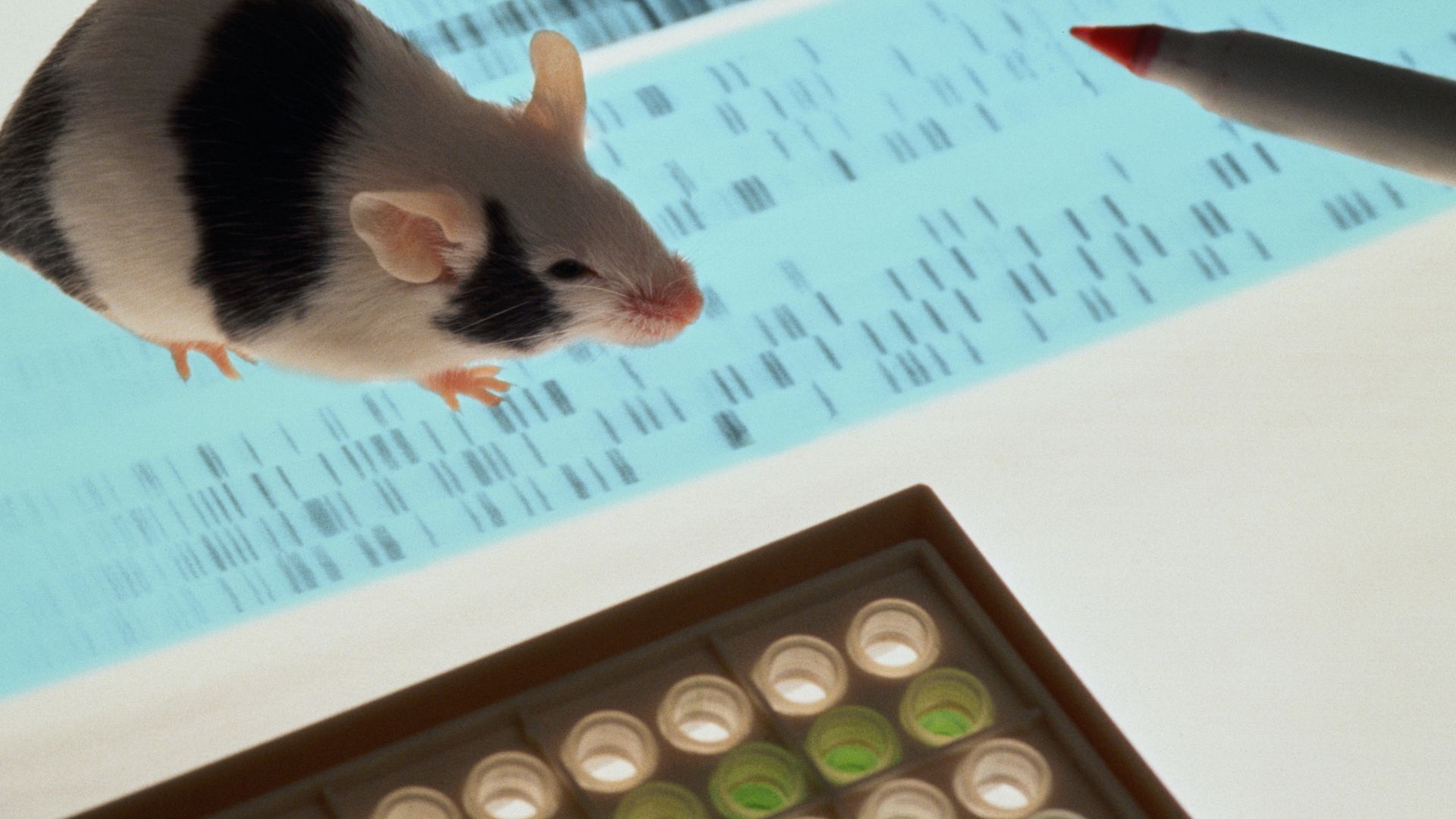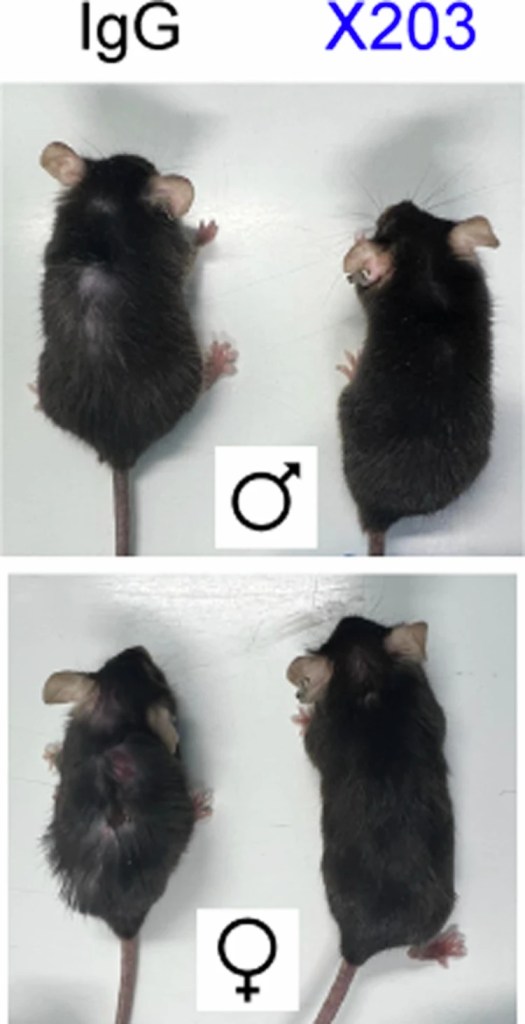
‘Supermodel granny’ mice could be key to slow human aging
By Karah Rucker (Anchor), Shea Taylor (Producer), Jonah Applegarth (Graphics Operator)
Scientists may have found an answer to aging, according to a study published in the journal Nature. While testing a new drug on mice, scientists said they found it increased their lifespans by up to 25%.
Media Landscape
See how news outlets across the political spectrum are covering this story. Learn moreBias Distribution
Left
Right
Untracked Bias
The mice, called “supermodel grannies” because of their youthful appearance, became overall healthier and stronger than those that did not get the drug. The mice also developed fewer cancers.

Download the SAN app today to stay up-to-date with Unbiased. Straight Facts™.
Point phone camera here
Researchers said mice that were given the drug lived for an average of 155 weeks, compared to the 120-week lifespan of the other mice. They said the research points to the prospect the drug could extend healthy aging in humans. The drug could not only reduce the signs of aging but also the frailty often associated with it.
In addition to reducing cancer deaths in the mice, the drug also reduced many diseases caused by chronic inflammation and poor metabolism, which are common signs of aging. Scientists at the Imperial College London found switching off a protein called IL-11 was the key.
IL11 levels go up as people get older. Researchers tested the impact of IL-11 by creating mice that had the protein deleted from their genes and found that doing so extended their lives by an average of 20%.

They also tested an IL-11 antibody drug on mice that were 75 weeks old – which equates to 55 years old in humans. They found the lifespans of those mice went up by as much as 25%.
The drug is already being tested in certain people, but it’s still not known what effect it will have.
[KARAH RUCKER]
SCIENTISTS MAY HAVE FOUND AN ANSWER TO AGING.
WHILE TESTING A NEW DRUG ON MICE – THEY FOUND IT INCREASED THEIR LIFESPANS BY UP TO 25 PERCENT.
THEY DECIDED TO CALL THE MICE “SUPERMODEL GRANNIES” BECAUSE OF THEIR YOUTHFUL APPEARANCE… BUT THEY ALSO BECOME OVERALL HEALTHIER AND STRONGER THAN THE MICE THAT DIDN’T GET THE DRUG – AND THEY DEVELOPED FEWER CANCERS.
RESEARCHERS SAY MICE THAT WERE GIVEN THE DRUG LIVED FOR AN AVERAGE OF 155 WEEKS – COMPARED TO THE 120-WEEK LIFESPAN OF THE OTHER MICE.
THEY SAY THIS POINTS TO THE PROSPECT THE DRUG COULD EXTEND HEALTHY AGING IN HUMANS – NOT ONLY REDUCING THE SIGNS OF AGING, BUT REDUCING THE FRAILTY OFTEN ASSOCIATED WITH IT, AS WELL.
NOT ONLY DID THE DRUG REDUCE CANCER DEATHS IN THE MICE – IT ALSO REDUCED MANY DISEASES CAUSED BY CHRONIC INFLAMMATION AND POOR METABOLISM – WHICH ARE COMMON SIGNS OF AGING.
SCIENTISTS AT THE IMPERIAL COLLEGE LONDON FOUND SWITCHING OFF A PROTEIN CALLED I-L-11 WAS THE KEY.
I-L-11 LEVELS GO UP AS WE GET OLDER.
THEY TESTED THE IMPACT OF I-L-11 BY CREATING MICE THAT HAD THE PROTEIN DELETED FROM THEIR GENES.
THEY FOUND THAT EXTENDED THEIR LIVES BY AN AVERAGE OF 20 PERCENT.
THEY ALSO TESTED AN I-L-11-ANTIBODY DRUG ON MICE THAT WERE 75 WEEKS OLD – WHICH EQUATES TO 55 YEARS OLD IN HUMANS.
THEY FOUND THE LIFESPANS OF THOSE MICE WENT UP BY AS MUCH AS 25 PERCENT.
THE DRUG IS ALREADY BEING TESTED IN CERTAIN PEOPLE – BUT IT’S STILL NOT KNOWN WHAT EFFECT IT’LL HAVE.
Media Landscape
See how news outlets across the political spectrum are covering this story. Learn moreBias Distribution
Left
Right
Untracked Bias
Straight to your inbox.
By entering your email, you agree to the Terms & Conditions and acknowledge the Privacy Policy.
MOST POPULAR
-
 Getty Images
Getty Images
Trump admin seeking to sell nearly 450 vacant, underused federal spaces
Watch 3:0017 hrs ago -
 Getty Images
Getty Images
US stops intelligence aid to Ukraine amid overnight Russian attacks
Read17 hrs ago -
 Getty Images
Getty Images
Gene Hackman’s dead dog misidentified as details continue unfolding
Watch 2:0018 hrs ago -
 Getty Images
Getty Images
Trump praises BlackRock for $19 billion Panama Canal investment
Watch 2:3718 hrs ago




